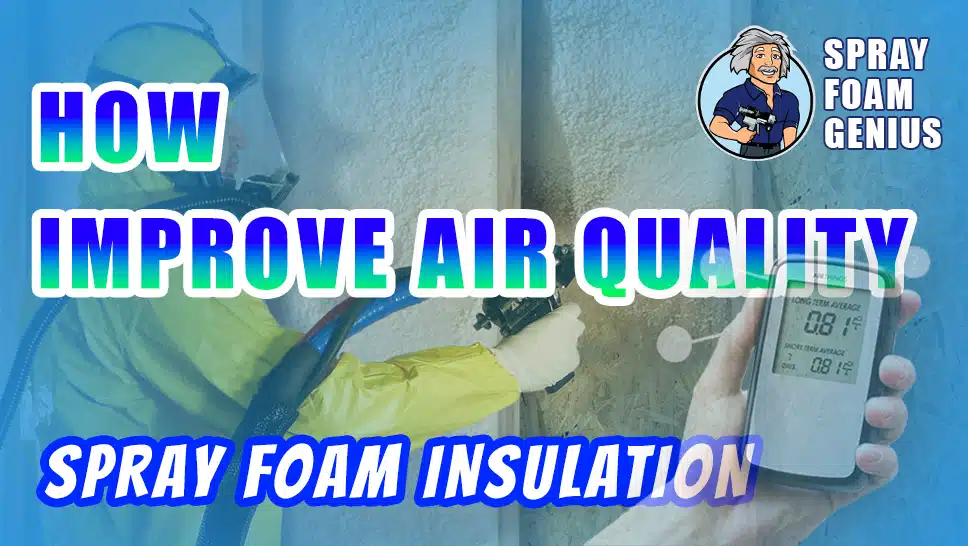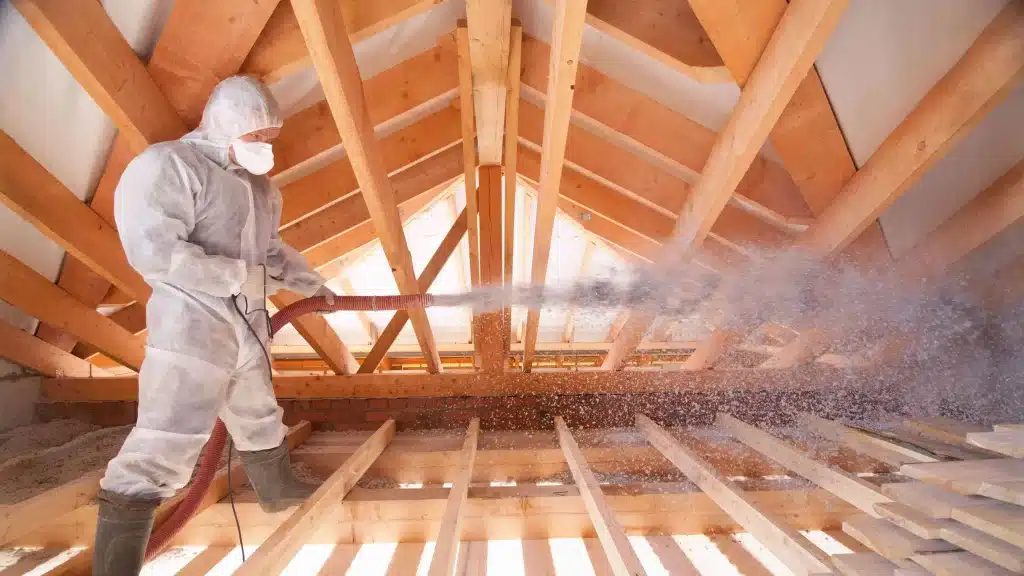
In today’s world, where the importance of a healthy living environment is more recognized than ever, indoor air quality (IAQ) has become a critical aspect of home comfort and safety. One often overlooked yet highly effective solution for improving IAQ is spray foam insulation. Beyond its well-known benefits of energy efficiency and thermal comfort, spray foam insulation plays a crucial role in enhancing the air quality within your home. In this comprehensive guide, we will delve into how spray foam insulation improves indoor air quality and why it’s a smart choice for homeowners in the USA and Canada.
Understanding Indoor Air Quality: Why It Matters
Before we explore how spray foam insulation contributes to better indoor air quality, it’s essential to understand what IAQ is and why it matters. Indoor air quality refers to the condition of the air inside buildings, particularly as it relates to the health and comfort of the occupants. Poor IAQ can lead to a range of health issues, including allergies, respiratory problems, and even long-term illnesses.
Several factors contribute to poor indoor air quality, including:
- Pollutants: These include dust, pollen, pet dander, mold spores, and volatile organic compounds (VOCs) from household products and building materials.
- Humidity Levels: Excessive moisture can lead to mold growth, while overly dry air can cause respiratory discomfort.
- Air Leakage: Uncontrolled air leakage allows outdoor pollutants, allergens, and unconditioned air to enter the living space.
Spray foam insulation addresses these issues by creating a more controlled and healthier indoor environment.
How Spray Foam Insulation Works
Spray foam insulation is a versatile material that expands upon application, filling gaps and creating a continuous barrier that adheres to the surfaces it contacts. There are two main types of spray foam insulation: open-cell and closed-cell.
- Open-Cell Spray Foam: This type is less dense, allowing some air and moisture permeability. It’s ideal for interior walls and areas where breathability is desired.
- Closed-Cell Spray Foam: Denser and more rigid, closed-cell spray foam acts as a vapor barrier and is commonly used in areas prone to moisture, such as basements and exterior walls.
Both types offer significant benefits for improving indoor air quality, though closed-cell spray foam is particularly effective in creating an airtight seal.
Sealing Out Pollutants and Allergens
One of the primary ways spray foam insulation improves indoor air quality is by sealing out pollutants and allergens. Air leaks around windows, doors, and other building envelope penetrations can allow dust, pollen, and other outdoor contaminants to infiltrate your home. Traditional insulation materials like fiberglass and cellulose may leave gaps and don’t fully prevent air movement.
Spray foam insulation, however, expands to fill every nook and cranny, creating an airtight seal that blocks the entry of outdoor pollutants. By reducing the infiltration of allergens and pollutants, spray foam insulation helps maintain a cleaner, healthier indoor environment, especially for individuals with allergies or respiratory issues.
Preventing Mold Growth Through Moisture Control
Moisture is a significant contributor to poor indoor air quality, as it can lead to the growth of mold and mildew. Mold spores can become airborne, leading to respiratory problems, allergic reactions, and other health issues. Traditional insulation materials, such as fiberglass, can absorb moisture, creating a breeding ground for mold.
Spray foam insulation, particularly closed-cell foam, is highly resistant to moisture. When applied, it forms an impermeable barrier that prevents water vapor from passing through walls, ceilings, and floors. This moisture control capability is crucial in preventing the conditions that lead to mold growth. By keeping moisture at bay, spray foam insulation helps protect indoor air quality and the structural integrity of your home.
Reducing VOCs and Improving Chemical Safety
Volatile organic compounds (VOCs) are chemicals that can off-gas from building materials, paints, furniture, and household products. High levels of VOCs can contribute to poor indoor air quality, leading to headaches, dizziness, and other health concerns. Some insulation materials, such as certain types of spray foam, have been scrutinized for their potential VOC emissions.
However, many spray foam products are now formulated to be low in VOCs, making them a safer choice for indoor environments. When selecting spray foam insulation, it’s essential to choose products that meet stringent VOC standards. By doing so, you can ensure that your insulation contributes to a healthier indoor environment rather than compromising it.
Enhancing Thermal Comfort and Air Quality
Thermal comfort and indoor air quality are closely linked. A home that is poorly insulated or has air leaks will experience temperature fluctuations and drafts, leading to discomfort and potential health issues. When HVAC systems struggle to maintain consistent indoor temperatures, they may overwork, leading to increased energy consumption and poor air circulation.
Spray foam insulation enhances thermal comfort by creating a continuous air barrier that prevents unwanted heat loss or gain. This consistent temperature control reduces the strain on HVAC systems, leading to more efficient operation and better air quality. By keeping your home at a stable temperature, spray foam insulation helps maintain optimal humidity levels and reduces the likelihood of condensation, which can contribute to mold growth.
Long-Term Benefits: Energy Efficiency and IAQ
While the focus of this article is on indoor air quality, it’s worth noting that the energy efficiency benefits of spray foam insulation also play a role in improving IAQ. By reducing the workload on HVAC systems, spray foam insulation decreases energy consumption, leading to lower utility bills and a reduced carbon footprint. But beyond the environmental and financial benefits, this energy efficiency also contributes to better air quality.
When HVAC systems run more efficiently, they circulate air more effectively, reducing the presence of indoor air pollutants. Additionally, the airtight seal created by spray foam insulation minimizes the introduction of outdoor contaminants, further enhancing indoor air quality. The long-term benefits of spray foam insulation are thus twofold: improved energy efficiency and a healthier living environment.
Why Choose Spray Foam Insulation for Your Home

At Spray Foam Genius Marketing, we understand the importance of creating a healthy and comfortable home environment. We work exclusively with spray foam insulation contractors who are experts in their field and committed to providing high-quality insulation solutions. If you’re concerned about indoor air quality, spray foam insulation is an excellent investment that offers numerous benefits:
- Airtight Seal: Prevents outdoor pollutants, allergens, and contaminants from entering your home.
- Moisture Resistance: Reduces the risk of mold growth by controlling moisture levels.
- Low VOC Options: Choose spray foam products that prioritize chemical safety and low emissions.
- Energy Efficiency: Lower energy bills and reduce your carbon footprint while improving air quality.
- Long-Term Durability: Spray foam insulation is a long-lasting solution that will continue to protect your home for decades.
Get Started with Spray Foam Insulation Today
If you’re ready to improve the indoor air quality of your home, consider investing in spray foam insulation. Our team at Spray Foam Genius Marketing is here to connect you with professional spray foam insulation contractors who can assess your needs and provide the best solution for your home.Call us at 877-840-FOAM for USA and 844-741-FOAM for Canada visit our website at sprayfoamgeniusmarketing.com, or email us at [email protected] to get started. Take the first step towards a healthier, more comfortable home today.
- Social Media Marketing for Spray Foam Businesses: What Works in 2025? - February 6, 2025
- Best SEO Strategies for Spray Foam Insulation Contractors to Rank #1 on Google - February 6, 2025
- What is Spray Foam Insulation? Benefits and Applications - February 5, 2025

